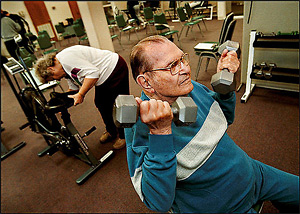 |
 |
 |
 Health & Beauty | July 2006 Health & Beauty | July 2006  
To Your Enduring Health: Do Chores, Live Longer
 David Brown - Washington Post David Brown - Washington Post


| | It doesn't have to be 20 minutes a day of aerobic exercise - or even be exercise. It can be household chores, yardwork, child care, volunteer activities on one's feet - anything that expends energy. (Dudley M. Brooks/Washington Post) |
Putterers and fidgeters, take heart! You have just as much to gain as power walkers and iron pumpers.

A new study of healthy older people found that the more active a person is, the longer he or she is likely to live. That alone is not terribly surprising. What's new is that it apparently doesn't matter what form the activity takes.

It doesn't have to be 20 minutes a day of aerobic exercise - or even be exercise. It can be household chores, yardwork, child care, volunteer activities on one's feet - anything that expends energy.

Most studies of the relationship between health and physical activity have hinged on people's reports of what they do each day - data that can be notoriously inaccurate. Researchers at the University of Pittsburgh and the University of Tennessee at Memphis took a different tack. They used an objective measure of activity not subject to "recall bias."

They gave 302 adults, whose average age was 75, a dose of water made of heavier-than-normal isotopes of oxygen and hydrogen, which was absorbed into their tissues and then slowly released.

The oxygen left the body as carbon dioxide, which is produced with activity. The researchers returned two weeks later and measured the amount of labeled oxygen in each person. The less there was, the more active the person had been.

The researchers followed the subjects for six years. Over that period, 12 percent of people in the one-third of the group who were most active subjects died. In the one-third with midrange activity, 18 percent died. In the least active third, 25 percent died.

The benefit can be from "usual daily activities that expend energy and not necessarily from volitional exercise," wrote the leader of the experiment, Todd M. Manini of the National Institute on Aging in Bethesda.

But that's not the only good news. This study, which is to appear today in the Journal of the American Medical Association, suggests that physical activity has an even bigger effect on health in old age than was previously thought. | 
 | |
 |



